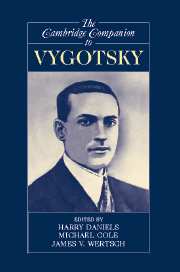Book contents
- Frontmatter
- Editors’ Introduction
- Part I: Vygotsky in Context
- Part II: Readings of Vygotsky
- 6 Terminology in L. S. Vygotsky’s Writings
- 7 Mediation
- 8 Vygotsky and Culture
- 9 Thought and Word: The Approaches of L. S. Vygotsky and G. G. Shpet
- 10 The Development of Children’s Conceptual Relation to the World, with Focus on Concept Formation in Preschool Children's Activity
- 11 Inside and Outside the Zone of Proximal Development: An Ecofunctional Reading of Vygotsky
- Part III: Applications of Vygotsky’s Work
- References
- Index
11 - Inside and Outside the Zone of Proximal Development: An Ecofunctional Reading of Vygotsky
from Part II: - Readings of Vygotsky
Published online by Cambridge University Press: 28 November 2007
- Frontmatter
- Editors’ Introduction
- Part I: Vygotsky in Context
- Part II: Readings of Vygotsky
- 6 Terminology in L. S. Vygotsky’s Writings
- 7 Mediation
- 8 Vygotsky and Culture
- 9 Thought and Word: The Approaches of L. S. Vygotsky and G. G. Shpet
- 10 The Development of Children’s Conceptual Relation to the World, with Focus on Concept Formation in Preschool Children's Activity
- 11 Inside and Outside the Zone of Proximal Development: An Ecofunctional Reading of Vygotsky
- Part III: Applications of Vygotsky’s Work
- References
- Index
Summary
The Zone of Proximal Development (ZPD) has drawn attention from psychologists and educators and has oriented their research, diagnosis, and educational work toward new grounds. We hold that, rather than a term to be added to conventional psychology and pedagogy, the ZPD provides us with an instrument whose use will inevitably lead to a reappraisal and renewal of theory.
We suggest that this concept also operated as a Zone of Proximal Development in its own right for Vygotsky's theoretical thought. He focused his endeavors on the areas of conflict where his contemporaries ran into difficulties by exploring three theoretical frontiers:
The evolutionary and historical frontier (change and evolution of the child and individual, of the species, of cultures).
The identity frontier (the view of the functional system as shared, of functions as socially distributed).
The ecological frontier between the internal and external, the mental and the material, the organism and the medium.
A large part of the literature on Vygotsky and the research carried out on the basis of his ideas have developed his proposals with regard to the first two frontiers. Although the third frontier has received scant attention, it is in our opinion essential to a full understanding of Vygotsky's thought, especially the concept of ZPD. We will therefore pay special attention to this third frontier. Taking the ecofunctionalist influences on his thought as a framework, we will analyze the internal and external context of the ZPD and the internal and external mediation processes and conclude with a reflection on the possible future projection for Vygotskian approaches.
- Type
- Chapter
- Information
- The Cambridge Companion to Vygotsky , pp. 276 - 304Publisher: Cambridge University PressPrint publication year: 2007
- 40
- Cited by

